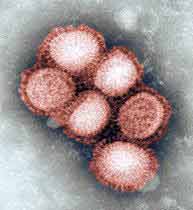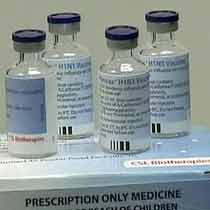
Health officials around the world are preparing for a surge in the number of H1N1 flu cases, also known as swine flu. But while rich nations may have the resources to produce or acquire adequate doses of vaccine, developing countries could fall far short.
In June, the World Health Organization announced that an H1N1 global pandemic was underway. The action was taken not because of the severity of the illness, but the extent to which to new virus had traveled around the world.
Potentially a big problem
So how serious a problem is the so-called swine flu?
Dr. Ruth Karron, director of the Center for Immunization Research and the Johns Hopkins Vaccine Initiative, says the disease should be taken "very seriously."
"I don't think that anybody can absolutely predict at this point what the final impact of this new virus is going to be...Because we know that this virus is a really highly infectious virus," she says.
She says however that health officials don't know at this time how ill those infected will become.
"So far a lot of this illness that it's caused is mild...If the virus starts causing worse illness, then I think the fact that it's so infectious and readily transmitted is really a problem," she says.
Also she says H1N1 flu has the potential of being more severe in poor countries simply because there is more underlying disease there overall.
Not enough to go around
In the United States, health officials are debating whether 600 million doses of vaccine will be needed to deal with the pandemic.

"The assumption has been for this new vaccine we would need to give two doses. So, if there are 300 million people in the United States, and everybody needs two doses, that's how you get to the number of 600 million," she says.
Some have posed the question that if the United States and European nations are looking to produce or procure huge amounts of H1N1 vaccine, should they also help poor nations do so?
"I think wealthier nations are looking at protecting their population and then they're also considering the needs of other countries. I know that some of the pharmaceutical companies have pledged some doses to a WHO (World Health Organization) stockpile of vaccine. How many doses and in what time frame I think is probably the difficult question," she says.
Poor countries may have to wait until the pharmaceutical companies fulfill their obligations to the wealthy nations. Karron says she expects the goal will be to make the vaccine available as soon as possible to afford the best protection.
Not like HIV/AIDS

In the earlier years of the HIV/AIDS pandemic, many accused the pharmaceutical companies of not doing enough to help poor countries. Legal battles erupted over the availability of ARVs, or anti-retroviral drugs.
Dr. Karron says conditions are different in this case.
When we were talking around ARVs, we were not talking about scarcity...That if you provided anti-retroviral drugs in resource-poor settings, it wasn't an issue that somebody in a wealthy country might not get the ARV that they needed. Here we're dealing with...scarcity," she says.
Nevertheless, she says the debate over how much to help poor countries will heat up if the pandemic grows more severe. And it's possible pharmaceutical companies could again face criticism.
Karron says the last major flu pandemic occurred in 1968, but she says much has improved in responding to illnesses.
"We can track viral spread in real time. We can understand the genetic composition of the viruses that are spreading in real time. We can make vaccine more rapidly and anti-virals. And we have more options for the kinds of vaccines that we make," she says.
She says because all these tools are now available, there is a responsibility to use them to combat the H1N1 pandemic.
Dr. Karron has conducted research for or consulted with pharmaceutical companies that produce flu vaccines.
In late August, the World Health Organization had confirmed over 209,000 cases of the so-called swine flu, with nearly 2200 deaths.
fall far short: 遠(yuǎn)遠(yuǎn)不足。fall short是“不足”的意思(To fail to attain a specified amount, level, or degree)。例:Now, our supply fall short of demand. 現(xiàn)在,我們的產(chǎn)品供不應(yīng)求。
anti-retroviral drug: 抗逆轉(zhuǎn)錄病毒藥品,是一類于治療逆轉(zhuǎn)錄病毒(主要是HIV)感染的藥物。
Related stories:
Panel warns of 90,000 possible US flu deaths
US schools to reopen amid flu concerns
Pregnant women at greater danger from H1N1 flu
WHO raises swine flu alert to highest level
(Source: VOA 英語點(diǎn)津編輯)